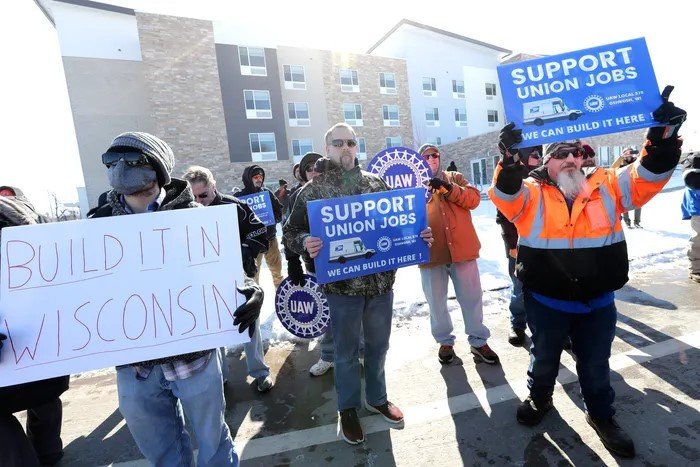Oshkosh Defense, UAW agree on wage increase to attract new workers
The United Auto Workers Local 578 labor union, which represents the workers of Oshkosh Defense, recently voted to approve a wage increase for company employees. The deal, which passed on December 19 last year, was designed to boost the salaries of incoming workers, and does so by raising starting wages to $24 or $25 an hour, depending on the position, and by shortening wage progression time from three years to only one year. In addition, the measure provides two 2% raises for all Oshkosh Defense workers, the first of which took effect on January 1 of this year and the second of which will come in October.
The deal is a response to a worker shortage faced by the company, and its negotiators hope that raising wages will help attract employees to the company, according to union president Bob Lynk.
“We’ve had a hard time since COVID getting people to work,” he said. “You can’t run a business if you’re running 200 people short.”
As a result of these worker shortages, Oshkosh Defense began outsourcing labor in some cases, violating the union’s contract and presenting other problems for the company.
“To me, it’s going to cost more to outsource work than if we do it ourselves,” Lynk said.
Dr. Benjamin Artz, chair of the Economics Department at University of Wisconsin-Oshkosh, argues that a high demand for workers across industries right now is making workers pickier as they search for employment opportunities. Ultimately, such difficulties with worker retention have spurred negotiations between workers and employees in situations like the wage increases at Oshkosh Defense.
“If I can find work anywhere, I can go and ask my employer for increased wages, and if they don’t give it to me, I can say that I’m going to go work somewhere else,” Artz said.
In a public statement regarding the wage increases, Oshkosh Defense alludes to their recent difficulties retaining employees.
“We are pleased that membership voted in favor of the proposal, and we look forward to working together to recruit and retain talented team members to meet the demands of our production requirements,” the company said.
Before last month’s negotiations, Oshkosh Defense was offering $17 to $19 an hour as starting wages, while competitors in the region tended to offer new employees $22 to $24 an hour, which Lynk believes is drawing potential workers away from the company. Since the raises were approved, the company has seen higher attendance at job fairs and has already made 150 job offers.
Although the measure passed with 64.5% of the union, it did not initially have such popular backing and in fact came after an earlier deal failed to pass in October of last year. This was due primarily to inadequate compensation for current workers, who had to work their way through the three year wage progression when they joined the company.
“Some of these guys have been here for 20, 30 years, and then you get some new guy coming in making as much as you do, and it’s not fair,” Lynk said.
While Lynk was hoping to have a larger immediate raise for existing employees, he brought the proposed two-part wage increase to be voted on by the union so that the new plan would be put into play sooner.
“Could we have gotten 4% up front? I think we could have. But if it got voted down again, they would outsource our work and then there would be the chance that more people would quit,” he said. “It’s my job to bring it to the membership because I believe membership is the highest power, and if they want to say no, it’s the people saying no.”
The success of these negotiations comes at a time when union activity has been increasing across the country, and the deal could be seen as part of a broader movement of worker empowerment.
“There is a revival, but it’s typically workplace by workplace, so when you zoom out and look at the whole economy, it’s hard to see increases in union activity. But, that said, there’s a lot of renewed interest in what unions can do,” Dr. Artz said.
Lynk believes that the recent success of a strike organized by the UAW at the Big Three Automakers, which comprises Ford, General Motors, and Stellantis, served as motivation for the workers of Oshkosh Defense as they negotiated this deal. He also cited instances of union activity, including at Oshkosh Defense, driving up wages at other companies in the industry, which helps workers trying to deal with the rising cost of living but makes it more difficult to recruit talent.
“$25 an hour put us at the top in the Fox Valley, but then last week Alliance announced $26,” he said.
He thinks that wages will continue to increase across industries as the cost of living goes up and workers negotiate with employers to achieve more beneficial contracts.
“$19-an-hour days, $20-an-hour days, are gone. People aren’t working for that anymore,” he said. “Times have changed since COVID, and the world’s going to have to change with it.”
by Aria Boehler
Published January 29, 2024
Oshkosh West Index volume 120 issue IV
